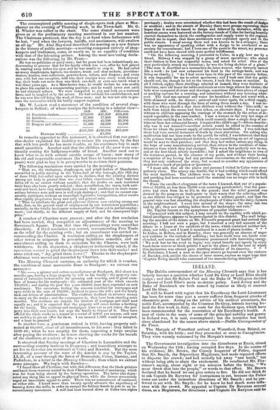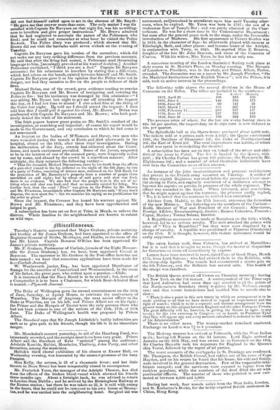IRELAND.
The Dublin correspondent of the Morning Chronicle says that it has latterly become a question whether Lord De Grey or Lord Eliot should resign ; and that Sir Robert Peel and the Duke of Wellington decided in favour of Lord Eliot's more moderate policy. Lord Jersey and the Duke of Buccleuch are both named by rumour as likely to succeed Lord De Grey. It will be heard with regret that his Excellency the Lord-Lieutenant has been for some time past a severe sufferer from frequent attacks of rheumatic gout. Acting on the advice of his medical attendants, the noble Earl, accompanied by the Countess De Grey, intends leaving Ire- land the first week in July, en route for the German spas, which have been recommended for the restoration of his Excellency's health. A tour of visits to the seats of some of the principal nobility and gentry in Ireland was, it is said, contemplated ; but the intention has been since abandoned for the causes above stated.—Dublin Correspondent of the Times.
The Marquis of Waterford arrived at Waterford, from Bristol, on Saturday, with his bride ; and they proceeded at once to Cunaghmore. They were warmly welcomed by the Marquis's tenantry.
The Government investigation into the disturbance at Ennis, closed on Wednesday the 15th; having occupied five days. In the course of his evidence, Mr. Brown, the County Inspector of Police, deposed that Mr. Smyth, the Stipendiary Magistrate, had made repeated efforts to disperse the crowd ; and had actually led away "one batch," but without being able to abate the excitement. He recollected Mr. Fitz- simon's saying, about eight or ten minutes before the firing, " We must throw shot into the people," or words to that effect. Mr. Brown declared that he heard no one give orders to fire. He did not think fit to ask Captain De Ruvynes for instructions to act, because the Police came out under the immediate directions of Mr. Smyth ; and he pre- ferred to act with Mr. Smyth ; for he knew he had much more influ- ence with the crowd. He appealed to Captain De Ruvynes several times, as a Magistrate, for directions ; and Captain De Ruvynes said he
did not feel himself called upon to act in the absence of Mr. Smyth : "He gave me that answer more than once. The only matter I was dis satisfied with Captain De Ruvynes on that night for, was his unwilling- ness to interfere and give proper instructions." Mr. Brown admitted that he had neglected to ascertain the names of the Policemen who fired; and he could not remember at what hour he visited the Police Barrack. The Police diary was produced ; which showed that Mr. Brown did not visit the barracks until seven o'clock on the evening of Tuesday. Captain De Ruvynes gave his version of the narrative ; which did not make out any very striking difference from the previous accounts. He said that after the firing had ceased, a Policeman used threatening language to him, [seemingly provoked at his want of decision.] Another Policeman exclaimed, "I think you are a fool." Captain De Ruvynes accounted for his reluctance to interfere by stating that a difference, which had arisen on the bench, existed between himself and Mr. Smith. Captain De Ruvynes gave it as his opinion that the Police were not in danger, nor had they occasion to fire on the people in defence of their Lives.
Michael Dolan, one of the crowd, gave evidence tending to convict Captain De Ruvynes and Mr. Brown of instigating and ordering the Police to fire : but his testimony was damaged by this admission—" I
was asking Mr. Hynes last night to get me off attending the inquest this day, as I bad not time to attend: I also asked him at the rising of the Court lasfnight. Eff told me I should attend the inquest : I then told him that I would give it against his client, Mr. Brown." Dolan was confronted with Captain De Ruvynes and Mr. Brown ; who both posi- tively denied the truth of his statement.
The Irish papers bestow great praise on Mr. Smith's conduct of the investigation, as searching and impartial : of course his report would be made to the Government, and any conclusion to which he had come is not announced.
An inquest on the bodies of M`Namara and Davey, two men who were wounded during the tumult at Ennis and died afterwards in the hospital, closed on the 16th, after three days' investigation. During the deliberation of the Jury, crowds had collected about the Court- house, and much excitement prevailed. Some of the jurors, suspected to be in the interest of one of the accused party, were frequently called out by name, and abused by the crowd in a scurrilous manner. After midnight, the Jury returned the following verdict-
" That the deceased, Michael Macnamara, came by his death from the effects of a gun-shot wound in the leg, inflicted on the night of the 6th June, by one
of a party of Police, consisting of sixteen men, stationed on the Mill Road, for
the protection of Mr. Bannatyne's property from a number of people there assembled on said night ; but by whom of said party said shot was fired, there is no evidence. We also find that the people were in the act of re-
tiring when said shot was fired, and that no necessity existed for firing. We further find, that the word ' Fire !' was given to the Police by Mr. Brown
and Mr. Fitzsimon, immediately after Captain De Ruvynes said, ' If you don't disperse, the men must fire ': but we consider his saying so no justification for the order so given."
Since the inquest, the Coroner has issued his warrant against Mr. Brown and Mr. Fitzsimon ; and they have been apprehended and lodged in gaol. A subscription has been set on foot at Trim, in Meath, to relieve the distress. Whole families in the neighbourhood are known to subsist on wild rape.



























 Previous page
Previous page